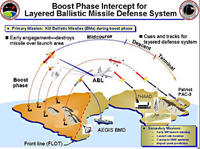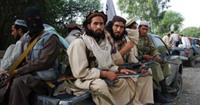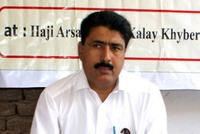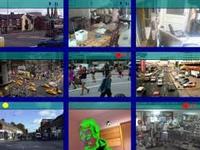-
Serious limitations make boost-phase missile interception impractical

One of the central elements of President Reagan’s 1983 “Star Wars” ballistic missile defense initiative was boost-phase defense: boost-phase defense systems are intended to shoot down enemy missiles immediately following launch while the rocket engine is still firing; a new congressionally mandated study by the National Research Council study says that to defend against ballistic missile attacks more effectively, the United States should concentrate on defense systems that intercept enemy missiles in midcourse and stop spending money on boost-phase defense systems of any kind
-
-
In Pakistan, stronger support for militant groups among the middle class than the poor

Expectations that poorer people are more susceptible to the appeals of violent groups have contributed to U.S. policies that focus on using aid to reduce poverty as a way to combat militant violence; a new survey found, however, that the poor in Pakistan were substantially more negative toward militant groups than their middle class countrymen
-
-
More traffic deaths following 9/11
In the wake of the terrorist attacks of 11 September 2001, many Americans started driving more due to a fear of flying — and lost their lives in traffic accidents; why did this happen more frequently in some states than in others? Why did Spanish driving habits not change in the same way following the 2004 train bombings in Madrid? Psychologists offer an answer
-
-
Lawmakers threaten Pakistan aid unless jailed Pakistani doctor is released

Senator Rand Paul (R-Kentucky) is threatening to hold up Senate business unless a discussion is scheduled on the fate of the jailed Pakistani doctor Shakil Afridi, who helped the United States locate Ossama bin Laden; Paul has been working for a month to bring the issue of U.S. aid to Pakistan to a vote – and he is gathering support for a vote on freezing all aid to Pakistan until Afridi is freed
-
-
The historical and future probabilities of 9/11-size terrorist events
On the eleventh anniversary of the 9/11 attacks, two statisticians apply statistical methods to try and accurately estimate the probability of a 9/11-size terrorist attack occurring during the next decade; examining the historical data from 1968 to 2007, they show that the likelihood of a 9/11-size attack occurring within this time frame was between 11 and 35 percent; looking forward, the likelihood increase to between 25 and 50 percent – and, under certain circumstances, to 95 percent
-
-
Bolstering e-mail security
On the whole, security is not a primary concern for most day-to-day e-mails, but some e-mails do contain personal, proprietary, and sensitive information, documents, media, photos, videos, and sound files; the open nature of e-mail means that they can be intercepted and if not encrypted, easily read by malicious third parties
-
-
Hurricane Isaac tests Loyola University's emergency response plans
In the days following Hurricane Isaac’s slow march across south Louisiana, Loyola University New Orleans administrators have been reviewing their response with a critical eye to ensure emergency preparations continue to evolve and meet the demands of each situation; beginning Tuesday, 28 August, New Orleans felt the first of Isaac’s high winds and heavy rains – but Loyola University was ready
-
-
Questions raised about cost, reliability of BioWatch upgrade

One year ago, DHS said a new contract for Biowatch, a system for detecting biological attacks on the United States, would be awarded in May 2012 and would cost an estimated $3.1 billion during its initial five years of operation; now DHS has decided to postpone the plans due to concerns about cost and reliability
-
-
Government considering options for post-biolab Plum Island

The Plum Island biolab, located on an 840-acre island of the tip of Long Island, has always been shrouded in mystery owing to the sensitive nature of the biological research done in its high-security facilities; now the center is being shut down by DHS, and the government is considering several options regarding what should be done on the island and the research facility
-
-
Netanyahu cancels security cabinet meeting on Iran after leaks

Israel’s prime minister, Benjamin Netanyahu, scheduled a 2-day marathon meeting of Israel’s security cabinet for Tuesday and Wednesday, with an 8-hour session planned for each day; the 2-day meeting was called for a thorough and comprehensive – and probably decisive — discussion of Iran’s nuclear weapons program and what should Israel do about it; the speakers on Tuesday included the directors of Israel’s military and civilian intelligence agencies; early Wednesday, Netanyahu abruptly canceled the meeting’s second session because of leaks from Tuesday top-secret meeting session appeared in the Israeli press
-
-
DHS funds more tests of autonomous power buoy for ocean surveillance

Ocean Power Technologies (OPT) has entered into an agreement with DHS Science & Technology Directorate to perform a new round of in-ocean tests on the company’s Autonomous PowerBuoy to demonstrate its use for ocean surveillance
-
-
DHS in settlement talks with employee who charged that ICE was being run “frat style”

DHS has entered into settlement talks with James Hayes, the head of New York ICE office, following a suit filed by Hayes against DHS secretary Janet Napolitano and ICE; the suit charged two female executives at ICE with turning the agency into a “frat house,” and with discrimination against male employees of the agency
-
-
Cloud OS for the U.S. intelligence community
Cloud management specialist Adaptive Computingis partnering with the investment arm of the CIA, In-Q-Tel, to develop a cloud operating system for use by U.S. intelligence agency
-
-
Assassination attempt on Quebec’s premier-elect foiled
A man shouting “The Anglos are waking up” broke into a victory party held by Pauline Marois, Quebec’s premier-elect and the leader of the separatist Parti Quebecois (PQ), after the party won the provincial election on Tuesday; the gunman missed Marois but killed one man and wounded two others; the PQ emerged as the largest party in the province, but it failed to win an outright majority; its minority government status means that it will not be able to push for a referendum on Quebec’s independence from Canada
-
-
Law-enforcement agencies eager for Web-surveillance tools

Private technology firms are pitching software capable of analyzing large swaths of the Internet to local law enforcement looking for ways to stop the next mass shooting or domestic terrorist event before it happens; police departments hope the software will help them detect online information from terrorists, traffickers, pedophiles, and rioters
-
More headlines
The long view
What Does Netflix’s Drama “Adolescence” Tell Us About Incels and the Manosphere?
While Netflix’s psychological crime drama ‘Adolescence’ is a work of fiction, its themes offer insight into the very real and troubling rise of the incel and manosphere culture online.
A Shining Star in a Contentious Legacy: Could Marty Makary Be the Saving Grace of a Divisive Presidency?
While much of the Trump administration has sparked controversy, the FDA’s consumer-first reforms may be remembered as its brightest legacy. From AI-driven drug reviews to bans on artificial dyes, the FDA’s agenda resonates with the public in ways few Trump-era policies have.
The Center Can Hold — States’ Rights and Local Privilege in a Climate of Federal Overreach
As American institutions weather the storms of executive disruption, legal ambiguity, and polarized governance, we must reexamine what it means for “the center” to hold.
How to Reverse Nation’s Declining Birth Rate
Health experts urge policies that buoy families: lower living costs, affordable childcare, help for older parents who want more kids
Foundation for U.S. Breakthroughs Feels Shakier to Researchers
With each dollar of its grants, the National Institutes of Health —the world’s largest funder of biomedical research —generates, on average, $2.56 worth of economic activity across all 50 states. NIH grants also support more than 400,000 U.S. jobs, and have been a central force in establishing the country’s dominance in medical research. Waves of funding cuts and grant terminations under the second Trump administration are a threat to the U.S. status as driver of scientific progress, and to the nation’s economy.
The True Cost of Abandoning Science
“We now face a choice: to remain at the vanguard of scientific inquiry through sound investment, or to cede our leadership and watch others answer the big questions that have confounded humanity for millennia —and reap the rewards.”
